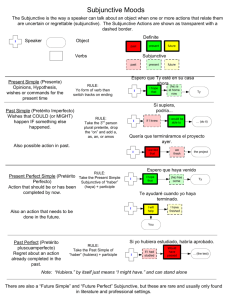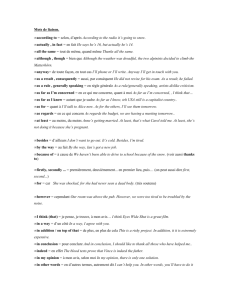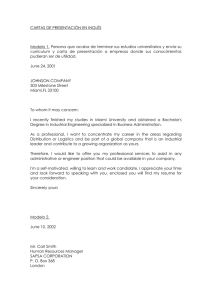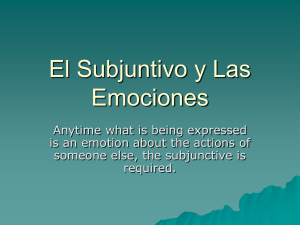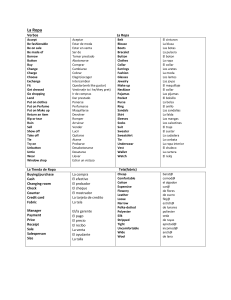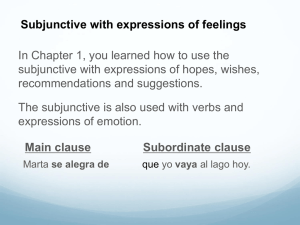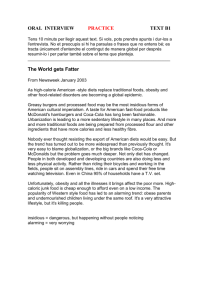Subjonctif - DouglasCountyForeignLanguage
advertisement
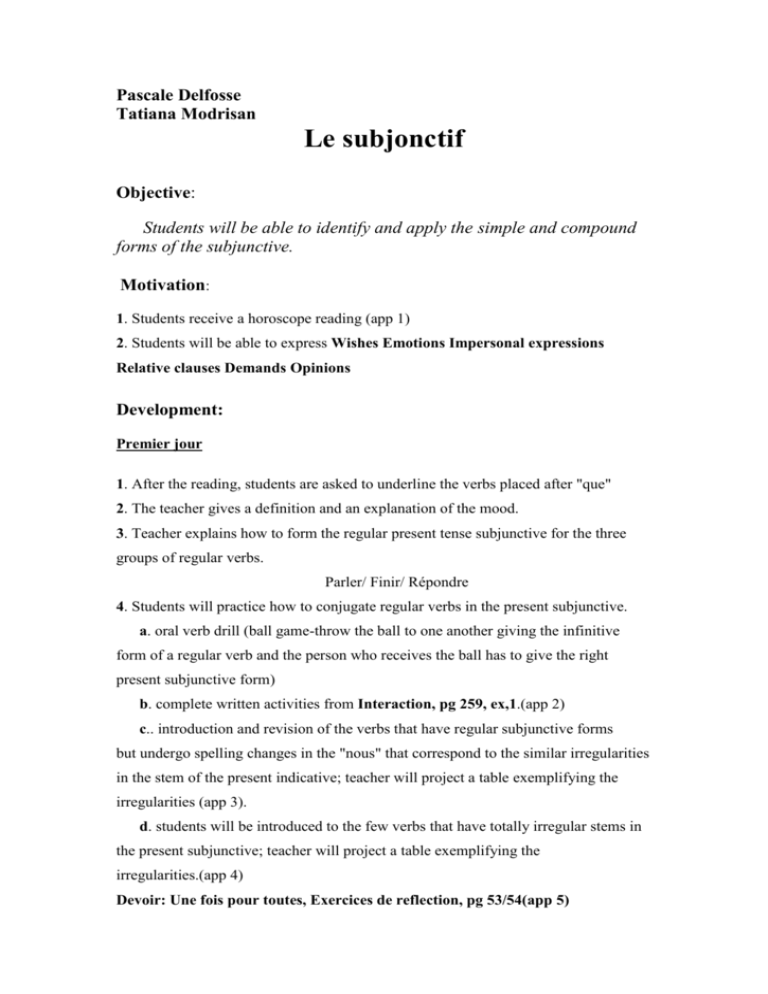
Pascale Delfosse
Tatiana Modrisan
Le subjonctif
Objective:
Students will be able to identify and apply the simple and compound
forms of the subjunctive.
Motivation:
1. Students receive a horoscope reading (app 1)
2. Students will be able to express Wishes Emotions Impersonal expressions
Relative clauses Demands Opinions
Development:
Premier jour
1. After the reading, students are asked to underline the verbs placed after "que"
2. The teacher gives a definition and an explanation of the mood.
3. Teacher explains how to form the regular present tense subjunctive for the three
groups of regular verbs.
Parler/ Finir/ Répondre
4. Students will practice how to conjugate regular verbs in the present subjunctive.
a. oral verb drill (ball game-throw the ball to one another giving the infinitive
form of a regular verb and the person who receives the ball has to give the right
present subjunctive form)
b. complete written activities from Interaction, pg 259, ex,1.(app 2)
c.. introduction and revision of the verbs that have regular subjunctive forms
but undergo spelling changes in the "nous" that correspond to the similar irregularities
in the stem of the present indicative; teacher will project a table exemplifying the
irregularities (app 3).
d. students will be introduced to the few verbs that have totally irregular stems in
the present subjunctive; teacher will project a table exemplifying the
irregularities.(app 4)
Devoir: Une fois pour toutes, Exercices de reflection, pg 53/54(app 5)
Deuxième classe
1. Start the class with the song "Tout le bonheur du monde".
www.platea.com
a. listen to the song.
b. cloze-activity: students receive the lyrics with blanks and they have to find
the missing word while the song is playing.(app 6).
c. the class sings the song together.
2. Students are assigned a list with expressions that require the subjunctive:
WEIRDO. Mention that se demander and espérer are exceptions. In groups of
two or three, students are asked to exchange/share their feelings (can be general).
Devoir: Une fois pour toutes, pg 62, Exercices de verification no.1,2,3. (app7)
Troisième classe
1. Class starts with online practice:
http://wps.prenhall.com/ca_ph_parmentier_enbons_7/46/11988/3069091.cw/conte
nt/
http://highered.mcgrawhill.com/sites/0072560320/student_view0/chapitre16/structures_1.html
2. Talk about the use of the subjunctive after impersonal expressions. A list will
be projected on the board. Mention that il est vrai que, il est évident que requires
the indicative.(app 8)
a. in class oral activity with flash cards: from a pile of impersonal expressions
flash cards each student will pick up a card and make up a sentence with the
expression.
3. Teacher will project the list of the conjunctions that introduce the subjunctive,
and mention that après que, dès que, aussitôt que, pendant que, tandis qu, parce
que, puisque, étant donne que. Are exceptions (app 9)
a. in class oral activity: from a pile of flashcards with conjunctions, each
student will pick up one flashcard and make a sentence.
4. Teacher will mention that it is not mandatory but preferable to use le ne expletif
after the expressions avant que, de peur que, de crainte que, à moins que, avoir
peur que, craindre que.
http://platea.pntic.mec.es/~cvera/hotpot/ne_expletifc.htma. Practice:
Devoir: Students receive a list of sentences using the subjunctive mood in the
subordinate clause. They will have to justify the use of the subjunctive. The
list will include the use of the subjunctive when the antecedent of a relative
pronoun is relative or modified by the superlative, and after some
expressions as quelque…que, quoi…que, quelle…que, qui…que, où…que (app
10).
Quatrième jour
1. Class discussion about the homework
2. Teacher introduces the past subjunctive by projecting a table explaining its
formation. (app 11)
3. Teacher emphasizes that past subjunctive is used when the action from the main
clause is happening after the action in the subjunctive clause.
Eg. Je ne crois pas qu'il ait lu le livre avant l'examen.
a. class practice:
http://www.restena.lu/amifra/exos/conj/subj3.htm
http://wps.prenhall.com/ca_ph_parmentier_enbons_7/46/11989/3069277.cw/conte
nt/
b. teacher explains that when the main clause and the subordinate clause have the
same subject, the subjunctive it is not used. In this case, the subordinate clause is
replaced by an infinitive
eg. Ne dites pas: Nous sommes heureux que nous allions en Italie.
Dites: Nous sommes heureux d'aller en Italie.
c.reading activitiy and package activity (app 12)
Devoir: Que souhaitez-vous? Faites une liste de cinq souhaits que vous voulez
voir se réaliser pour certaines personnes de votre entourage (vos parents, vos
amis, votre animal de compagnie).
<=Indexcontinuez
Tout le bonheur du monde.
Paroles: Mike et numéro 9. Musique: Sinsemilia et numéro 9. Album: Debout les yeux ouverts (2004). Maison de
production: Epic.
{Refrain:}
On vous souhaite tout le bonheur du monde
et que quelqu'un vous
la main, que votre chemin
les bombes, qu'il
vers de calmes jardins.
On vous souhaite tout le bonheur du monde, pour aujourd'hui comme pour
demain
que votre soleil
l'ombre, qu'il
d'amour au
quotidien.
Puisque l'avenir vous
, puisqu'on ne
pas
votre destin
que votre envol est pour demain comme tout ce qu'on a à vous offrir
ne saurait toujours vous suffire dans cette liberté à venir

